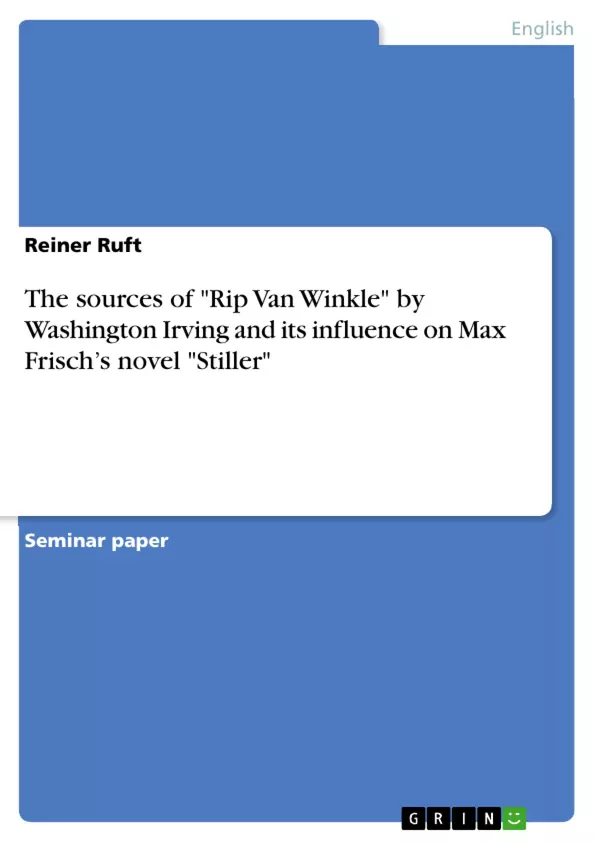Max Frisch novel "Stiller" was influenced by the American tale "Rip Van Winkle" by Washington Irving. Irving himself was influenced by a German source. In this work, the author tries to untangle the interwoven works of Frisch and Irving.
In the work the author singles out "Rip Van Winkle" by Washington Irving and expound it in a new with the assistance of a reverberation which this tale has had in the writings of the modern Swiss German author Max Frisch. The author is convinced that to draw certain conclusions from the influence a given work of literature exerts on later works of literature is as legitimate in literary interpretation as to infer anything from the use to which an author puts his source material. The author also believes that Frisch's modern exploitation of the "Rip Van Winkle" story may shed as much new light on Irving's achievement as the comparison between "Rip Van Winkle" and its German source in the tale of "Peter Klaus, the Goatherd" has done.
Table of Contents
- INTRODUCTION
- I. WASHINGTON IRVING'S USE OF HIS GERMAN SOURCE AND THE VARYING APPRAISALS OF THE CRITICS
- II. WASHINGTON IRVING'S INFLUENCE ON GERMAN AUTHORS IN THE NINETEENTH CENTURY.
- III. MAX FRISCH'S USE OF "RIP VAN WINKLE"
- IV. THE ISSUE: RIP'S "IDENTITY" PROBLEM
- FOOTNOTES.
- APPENDIX
Objectives and Key Themes
This paper examines the influence of the German folktale "Peter Klaus, the Goatherd" on Washington Irving's renowned story "Rip Van Winkle". It explores the source material, the critical reception of "Rip Van Winkle" and its German origin, and the story's influence on later literary works, particularly the writings of Max Frisch. The paper aims to shed light on the evolution of the story and its enduring impact on literary tradition.
- The role of source material in literary creation and interpretation
- The impact of German folklore on American literature
- The evolution and adaptation of literary themes across different cultural contexts
- The lasting influence of "Rip Van Winkle" on later works of literature
- The concept of identity and its exploration in literary narratives
Chapter Summaries
- Introduction: This chapter introduces the topic of the paper, outlining its focus on "Rip Van Winkle" and its connection to German literature. The author discusses the significance of examining the influence of source material on literary works and highlights the particular relevance of Max Frisch's adaptation of "Rip Van Winkle" in understanding Irving's achievement.
- I. WASHINGTON IRVING'S USE OF HIS GERMAN SOURCE AND THE VARYING APPRAISALS OF THE CRITICS: This chapter provides a detailed chronology of the research and critical reception of "Rip Van Winkle" and its German source, "Peter Klaus". It explores the varying interpretations of Irving's use of the German tale and the controversies surrounding allegations of plagiarism. The chapter highlights the importance of understanding the historical and cultural context surrounding the creation and reception of literary works.
Keywords
The central keywords of this paper are "Rip Van Winkle", "Peter Klaus", "Washington Irving", "Max Frisch", German folklore, source material, literary influence, identity, and adaptation. These keywords represent the core themes and concepts explored in the analysis of Irving's story and its relationship to German literature. The paper examines the impact of source material on literary creation, the evolution of literary themes across cultures, and the enduring influence of "Rip Van Winkle" on later works of literature.
- Citar trabajo
- Reiner Ruft (Autor), 1973, The sources of "Rip Van Winkle" by Washington Irving and its influence on Max Frisch’s novel "Stiller", Múnich, GRIN Verlag, https://www.grin.com/document/511396



